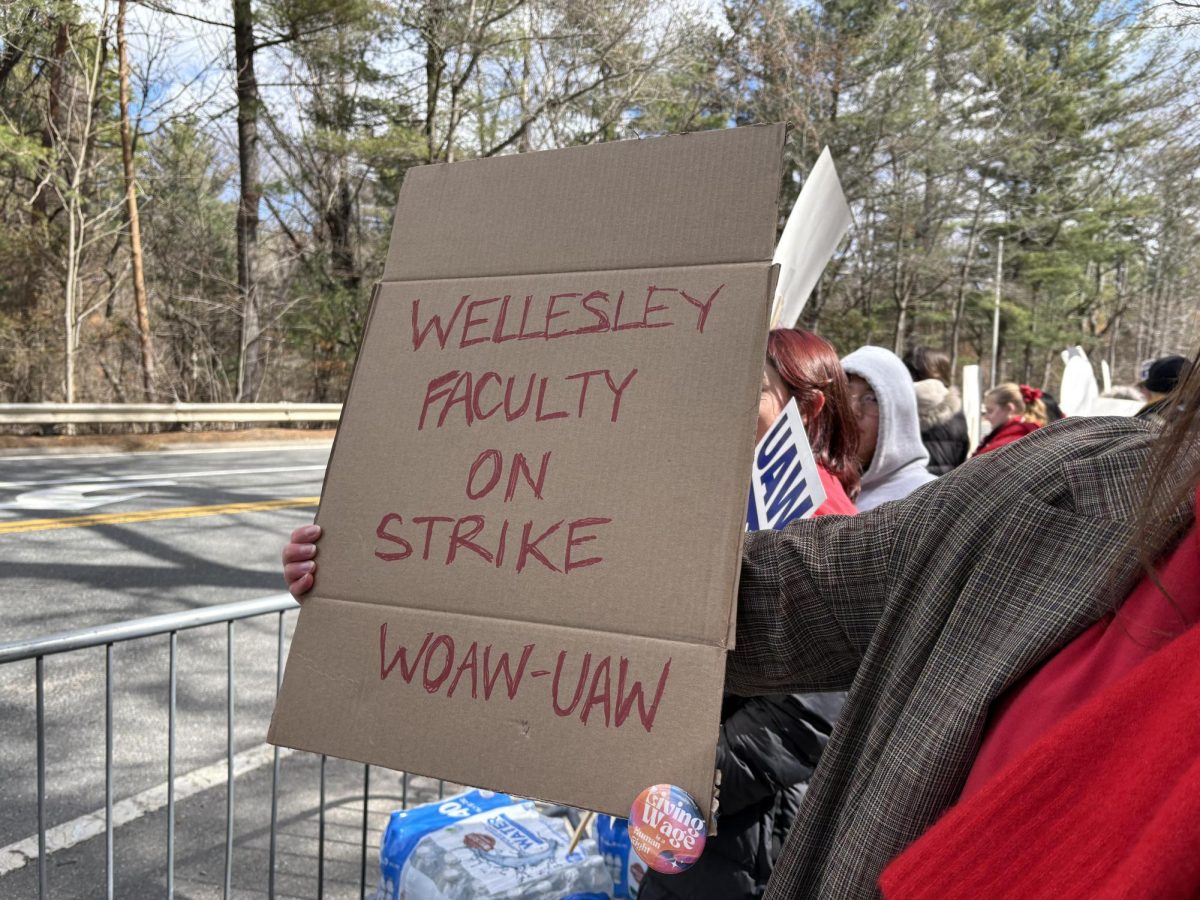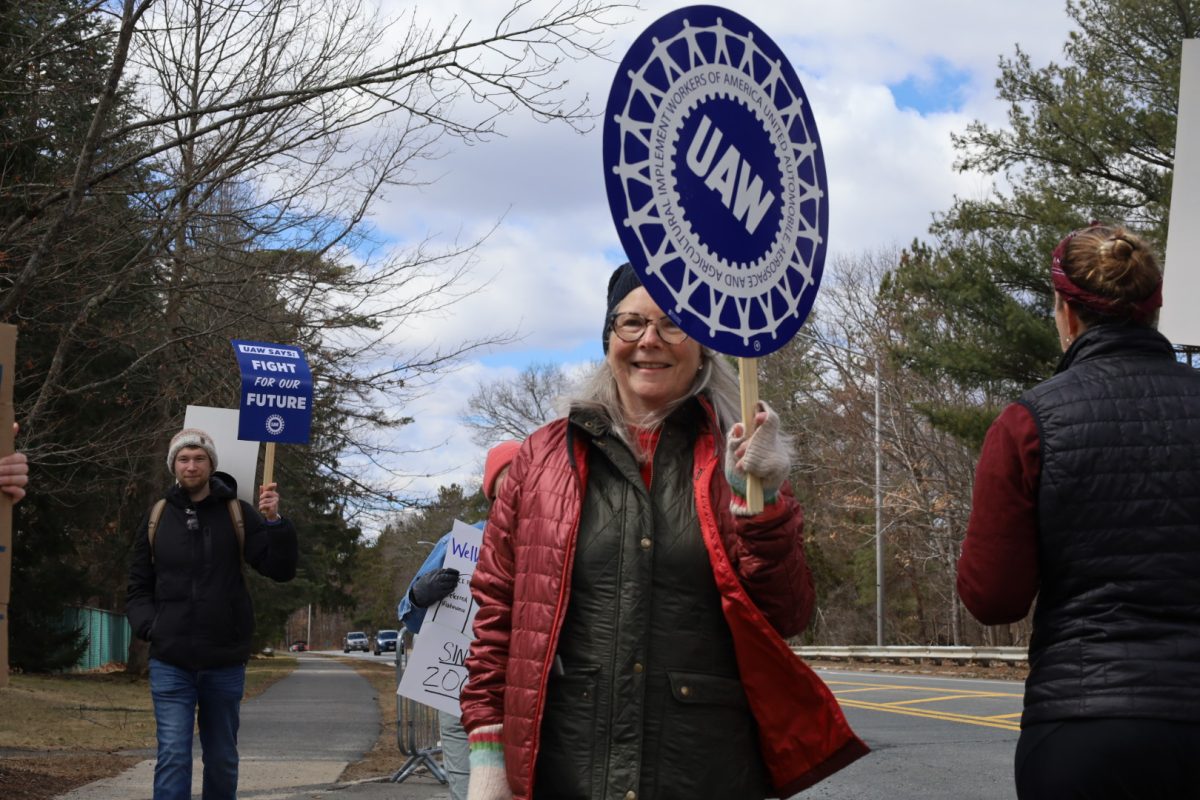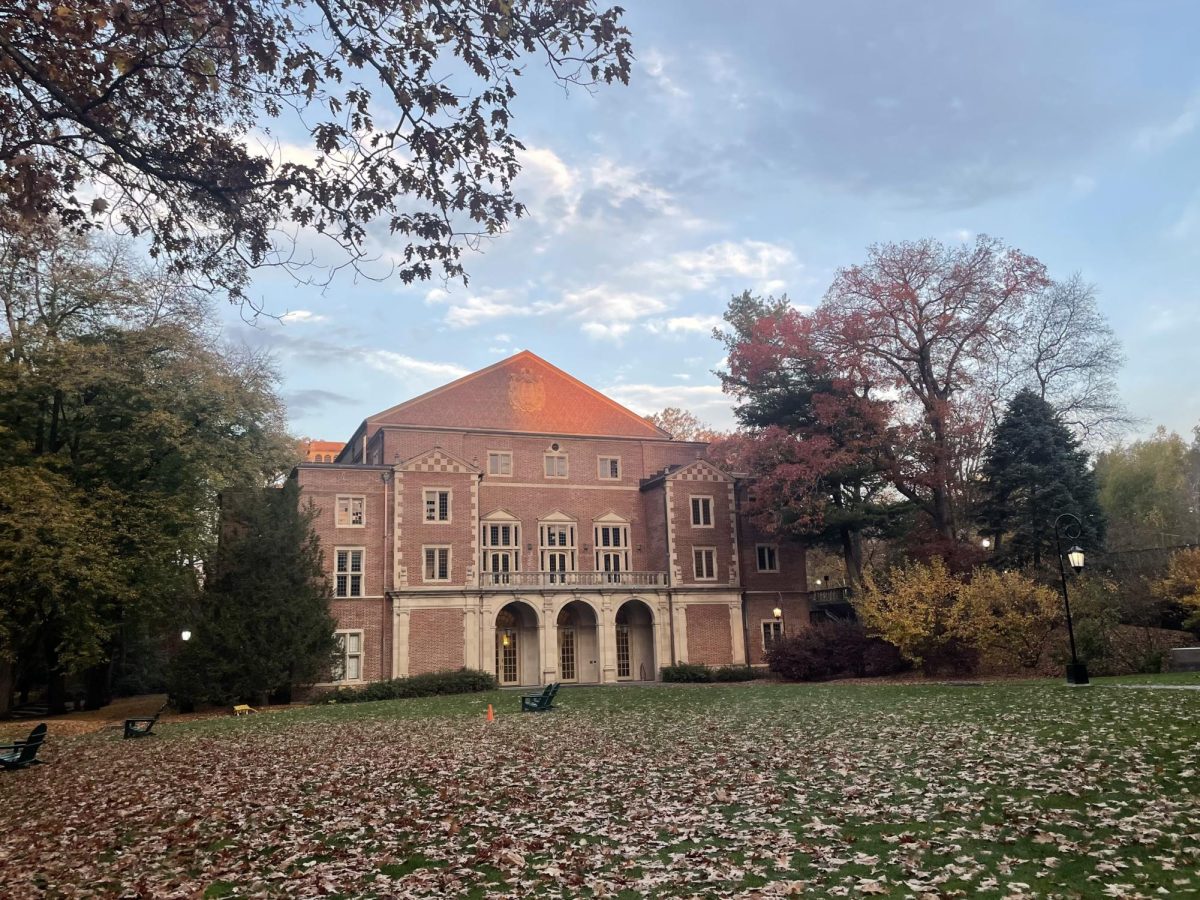Wellesley Organized Academic Workers (WOAW-UAW), the non-tenured track (NTT) faculty union, began picketing today at 8 a.m. after unsuccessful bargaining with the College on key issues such as compensation, workload, and protections.
The official strike with faculty and students is scheduled for 8 a.m. to 5 p.m. every day until WOAW and the College reach an agreement.
The College set an additional bargaining date on April 1, on top of their originally scheduled April 3 date.
When The Wellesley News visited picket lines at 2 p.m, there were about 50 people at picketing lines at the Central Street and College Road intersection and about 15 people at the Wellesley front entrance.
NTT faculty and students, many wearing red to support the strike, held signs that said “UAW On Strike. Unfair Labor Practice” and “I’d Rather Be Teaching.” The picketers cheered and waved their signs at cars honking in solidarity and led chants on the megaphone.
Sophia Bodor ’28, who led one of the chants on the megaphone, said that the uncertainty of her life at Wellesley inspired her to speak on the picket lines.
“There’s no real plan in place for when the strike’s going to end, what classes are going to look like during and after the strike,” said Bodor. “I just wanted to channel those emotions, so that’s what motivated me.”
This uncertain sentiment shared among students comes after Provost Courtney Coile, Dean of College Lia Gelin Poorvu ’56, and Registrar Carol Shanmugaratnam announced in an email this morning that students were only receiving 0.5 credits for WOAW-taught classes, and encouraged students to register for new courses to receive full credit.
“It was actually very scary to read at first, I haven’t been able to check which classes of mine are affected so far,” said Avery Miller-Fabregas ’27, a student picketer who has three classes taught by NTT faculty. “I empathize with seniors and people who are doing their theses [with NTT].”
WOAW members were also not aware that the College was planning to cut class credit. However, WOAW members Jacqueline Woodford and Anne Brubaker underscore that only faculty are responsible for giving out grades and deciding what qualifies as credit.
It is uncertain whether the College may be going against the Department of Education’s policy, which says that an institution cannot lower credits without justification.
Coile’s most recent email says that the strike has potential to impact eligibility for financial aid and impact on student immigration status as “federal regulations govern both the number of contact hours required to earn college credit and the number of credits a student must be enrolled in to maintain full-time status for financial aid and visa eligibility purposes.”
In a separate email to the News, the College wrote that Wellesley College, as an accredited higher education institution, must be able to demonstrate to outside agencies that students are earning credits in a timely way to make progress toward their degree. Since they do not know how long the strike would last, they created a plan “that will be effective no matter what the duration of the strike may be.”
Under the Higher Education Act, the Department of Education defines a credit hour based on instructional time and student workload. Institutions receiving federal funding must comply with this standard, and any changes to credit allocations must reflect legitimate academic criteria.
Rejecting Mediation
One day prior to the beginning of the strikes, President Paula Johnson, Provost Courtney Coile, Dean of the College Lia Gelin Poorvu ’56, and Chief Human Resources Officer Carolyn Sladoben sent a joint email titled “WOAW-UAW REJECTS MEDIATION—CHOOSES TO STRIKE.”
The email detailed how WOAW “outright rejected” the College’s new proposals on Monday, including offering professorial titles for NTT faculty and agreeing to fewer years for promotion eligibility, in exchange for “certain provisions in the Appointments and Reappointments that favored the College’s operational needs.”
The College further wrote that they offered “unprecedented increases in compensation” in exchange for an agreement on a five-course workload, representing a “30% increase in compensation” for bargaining unit employees (BUEs).
Lastly, the email wrote that the College “added stand-alone protections from bullying even when not linked to a protected category.”
The College wrote that the union rejected all other packages, except a modified proposal for the article
The News previously reported that the College proposed to move to federal mediation, a method used by Harvard and Tufts to reach agreements. The mediation firm no longer offers such services after a presidential action effectively minimized FMCA’s operations.
While Brubaker and Woodford acknowledged that WOAW rejected a mediation, they stressed that a mediator is typically called at the end of a bargaining process, and that WOAW was not yet at that point.
They believed that the College made this move because they “needed to have some way to blame it on us.”
“So their last plan to make it our fault that we’re striking is to request for mediation, which I think they knew was premature, because we aren’t at an impasse,” Woodford said. “They knew we would decline mediation, and therefore could use that against us.”
A Typical Picketing Day
While the official picketing begins at 8 a.m. every day, some WOAW members are at the picketing lines as early as 5 a.m. to help delivery workers, many who are union workers, to not cross picket lines. It’s uncertain if Wellesley deliveries will be changing.
Students can expect a more structured schedule at the picketing lines in the next few days, according to Brubaker and Woodford. In addition to union members speaking, WOAW also plans to invite state senators, such as Elizabeth Warren and Ed Markey, and 2023 commencement speaker Jocelyn Benson to the picket lines, though plans are not yet finalized.
The office of Elizabeth Warren, Ed Markey and Jocelyn Benson did not respond to a request for comments.
With the first day of striking over, WOAW members are energized about picketing, but have mixed feelings about the situation.
“We are so organized and ready and committed to fighting for a fair contract, and moved by the support from the community,” Brubaker said. “But [it’s] also sad and disappointing [that] the college is taking this route and what it will mean for our community after this is all over […] a lot of trust is broken.”
Contact the editors responsible for this article: Valida Pau, Sazma Sarwar
Updated to correct Jocelyn Benson as the 2023 commencement speaker, not 2024.





